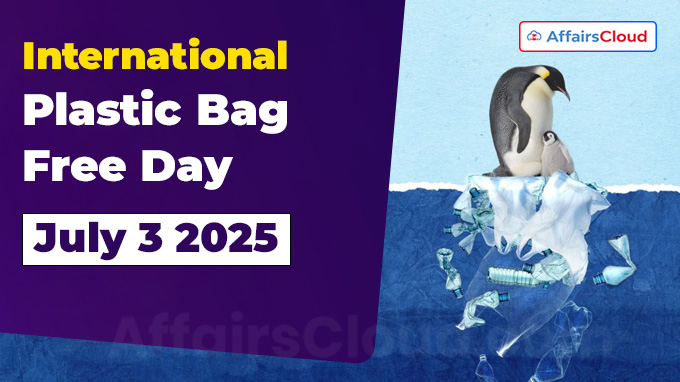 International Plastic Bag Free Day is observed globally every year on July 3 to raise awareness about the severe environmental damage caused by Single-Use Plastic (SUP) bags, which pollute ecosystems, endanger wildlife, and harm human health.
International Plastic Bag Free Day is observed globally every year on July 3 to raise awareness about the severe environmental damage caused by Single-Use Plastic (SUP) bags, which pollute ecosystems, endanger wildlife, and harm human health.
- The observance promotes reusable alternatives and urges governments, communities, and individuals to adopt sustainable practices.
Background:
i.The observance of International Plastic Bag Free Day began on 3 July 2008 in Catalonia, Spain, initiated by Rezero, a member of Zero Waste Europe (ZWE).
ii.In 2009, ZWE expanded the initiative across the European Union (EU).
iii.In 2015, the EU adopted the Plastic Bags Directive (EU 2015/720), amending the Packaging and Packaging Waste Directive (94/62/EC) to address lightweight plastic bag usage.
iv.In 2016, the day became part of the Break Free from Plastic (BFFP) Movement, a global coalition of over 1,500 organizations working to end plastic pollution.
Why Combat Plastic Bags?
i.Decomposition Time: Plastic bags take 400–1,000 years to break down, fragmenting into microplastics that contaminate soil and oceans.
ii.Marine Threat: Over 100,000 marine animals (e.g., turtles, whales) die annually from ingesting or entanglement in plastic. Bags resemble jellyfish, a common food source.
iii.Ocean Pollution: 8 Million Metric Tons (MMT) of plastic enter oceans yearly. Plastic bags form massive garbage patches like the Great Pacific Garbage Patch (discovered in 1997), spanning 1.6 million square kilometers.
iv.Human Health Risks: Burning plastic releases toxic gases. Microplastics enter the food chain, acting as endocrine disruptors.
v.Infrastructure Damage: Plastic bag litter clogs drainage systems, particularly during the monsoon season, which often results in severe urban flooding.
Global Actions:
i.Bangladesh (2002): Became the first country to ban thin plastic bags (≤20 microns, µm) after catastrophic flooding.
ii.New Zealand (July 2023): Became the first country to ban thin plastic bags in supermarkets as part of its national campaign against single-use plastics.
India’s Plastic Waste Management Initiatives:
i.1998 -Sikkim: Became the first Indian state to ban disposable plastic bags.
ii.2014 – Swachh Bharat Abhiyan(SBA): The Government of India (GoI) launched the Clean India Mission, promoting waste segregation at source and establishing plastic waste management systems.
iii.2016 – Plastic Waste Management Rules (PWMR): Issued by the Ministry of Environment, Forest and Climate Change (MoEF&CC) to establish a statutory framework for environmentally safe plastic waste handling.
iv.2016 – Thickness Regulation: India banned polythene bags under 20 microns to prevent drainage blockages.
v.2022 Amendment: Prohibited identified SUP items such as cutlery, straws, and plastic bags below 120 microns. Enforcement actions led to the seizure of 1,949,535 kilogram (kg) of illegal plastic.




